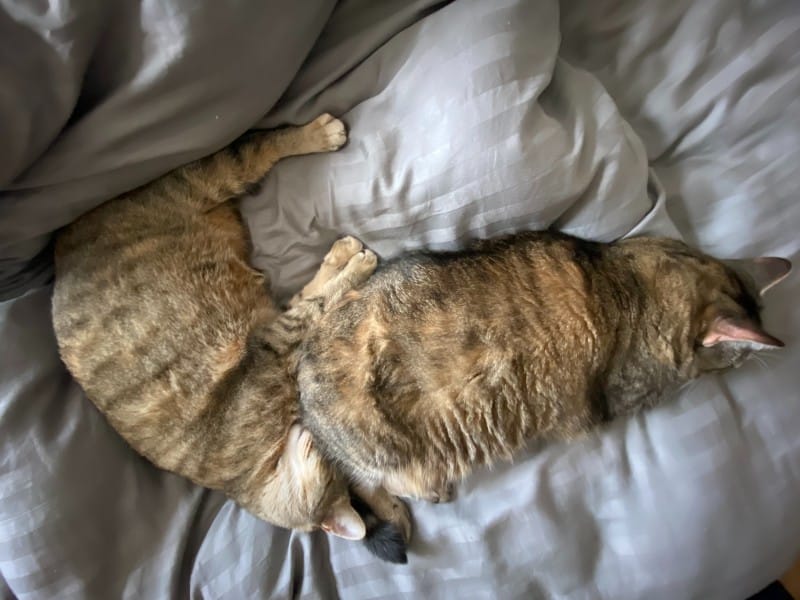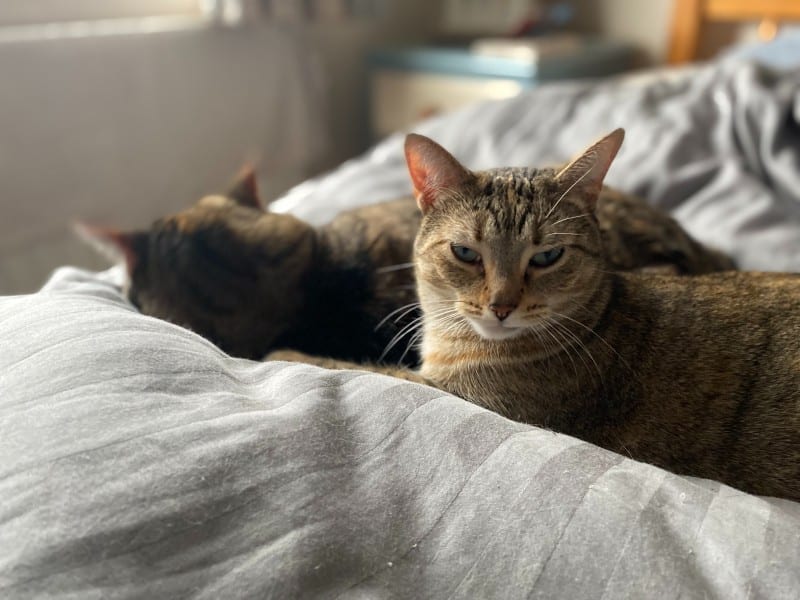[ad_1]
Hello, I’m Dr. Lauren! Learn my introduction to be taught extra about me and my two adventurous cats, Pancake and Tiller.
The stereotypical picture of a cat as aloof and uncaring is one which has been perpetuated all through media, anecdotes, and writing, resulting in a long-standing perception that canine are man’s greatest good friend, and cats merely don’t care.
Nothing could possibly be farther from the reality. And the disservice this has carried out cats, is immense. Why, you ask?
Separation Nervousness in Cats: Is It Actually a “Factor”?
Properly, feline medication has typically taken a step again from canine medication. For a very long time, the truth is, a lot of the veterinary occupation’s lifetime, cats have been handled as canine. However, we now know that is merely not true. Cats endure their very own distinctive ailments: hyperthyroidism, urinary blockages, feline hyperesthesia syndrome, and feline coronavirus, to call a couple of. To not say that cats don’t additionally endure from a number of the similar ailments as canine (or perhaps I ought to say canine endure from the identical ailments as cats!).
Partly, this inappropriate notion of aloofness is probably going why separation anxiousness in cats has been poorly acknowledged till current years. And nonetheless isn’t nicely spoken about. Comparably, in canine, and even people, it’s a reasonably well-known entity.
So, what’s separation anxiousness? To know that, first that you must perceive how attachment happens within the first place. Attachment begins when the offspring stays near its mom throughout youth. Partly, this aids survival, although different capabilities are additionally potential, akin to bonding, and socialization.
As veterinary college students, we discovered about separation anxiousness in canine, and the causes, the behavioural modification to appropriate it, and the medical remedies accessible. When it got here to cats, as with most behaviors, we merely didn’t focus on it. Canines have been man’s greatest pals… cats have been simply… cats.
In apply, we nonetheless don’t typically make the analysis of feline separation anxiousness. I typically joke about how Pancake sleeps 26 hours a day, however in reality, how do cats really feel when house owners go away? What about extraordinarily bonded cats? Cats, greater than canine, usually tend to be raised as orphans, often called bottle infants, that means that they often kind intense bonds with their early carers, in substitute of their mom.

Separation Nervousness In Concept vs Apply
I’ve definitely labored with many sufferers who’re fast to be described as upset when their proprietor leaves for a visit, and behave in another way upon return. My very own cats are very similar to this—hiding once they see the journey luggage come out, and never sleeping of their regular spots. Simply as I’m heading out the door, Pancake is infamous for doing a “you possibly can’t contact me” and sitting slightly below the kitchen desk, simply out of attain. Whereas Tiller retreats to underneath the mattress. On a standard day, they’d merely be asleep on the couch, and the mattress, respectively. So, definitely, they exhibit some delicate types of anxiousness, although not sufficient to be classed as pathological.
New know-how has additionally helped to make the conduct of cats extra obvious, as we now have cameras for in-home use, to trace what cats are doing, when we’re not round. Some even dispense treats.
What Behaviors Are Acknowledged For Cats With Separation Nervousness?
Minimal analysis has been carried out on the subject, however research have checked out owner-based questionnaires, to outline the difficulty. One research of 136 cats reported behaviors will be fairly different, together with issues akin to the next:
- Inappropriate urination and defecation
- Extreme vocalization
- Destructiveness
- Psychogenic grooming
Another fascinating findings additionally got here from this explicit research: feminine cats have been extra probably than males to defecate exterior the field and to partake in overgrooming, whereas males have been extra prone to carry out damaging behaviors. Inappropriate urination 75% of the time was carried out on the proprietor’s mattress.
Subsequently, separation anxiousness solely happens, by definition, when extended, inappropriate bodily responses happen to the bodily departure of the cat’s proprietor. In case your cat sits on the window and cries whenever you go away for a minute or two, then goes again to mattress, it’s not prone to be thought-about separation anxiousness.

If You Suspect Separation Nervousness In Your Cat, What Are Your Choices?
The very first thing to try to do is to get a video or movies of the conduct. This may help your vet affirm the suspicions.
- Residence cameras may help to doc this.
- Pay attention to different family modifications as nicely, and be aware these for dialogue along with your vet
- Schedule an appointment along with your vet; know that for some behavioral points, additional referral to a feline behaviorist could also be suggested. When reserving any behavioral appointment, ask if there may be any extra paperwork to fill out, as many vets may have questionnaires to fill out forward of time. And do point out the particular conduct that you’re involved about, as typically extra appointment time is required for behavioral points.
- Know that bloodwork and different diagnostics could also be carried out to rule out different issues. For instance, the hyperactivity, and typically overgrooming, that can happen with hyperthyroidism can typically mimic some parts of different points. Testing may help to rule this out.
- Know that behavioral points will be tough to deal with, and customarily, the longer it has been occurring, the tougher it may be to deal with. Typically, points can’t be absolutely resolved, although different occasions, they will.
- Be real looking about your expectations: what do you need to occur to the conduct? Are you prepared and in a position to medicate your cat every day? Twice every day? Comply with up with routine bloodwork, if wanted? Realizing this may help your vet or behaviorist to search out one of the best choices for you and your cat.
- Have you ever tried something already for the difficulty, akin to pheromone diffusers?
Ultimately, cats will not be small canine—however that doesn’t imply they don’t have related points that crop up, both. As an proprietor, you might be greatest in a position to acknowledge these points, and advocate to your cat!
[ad_2]